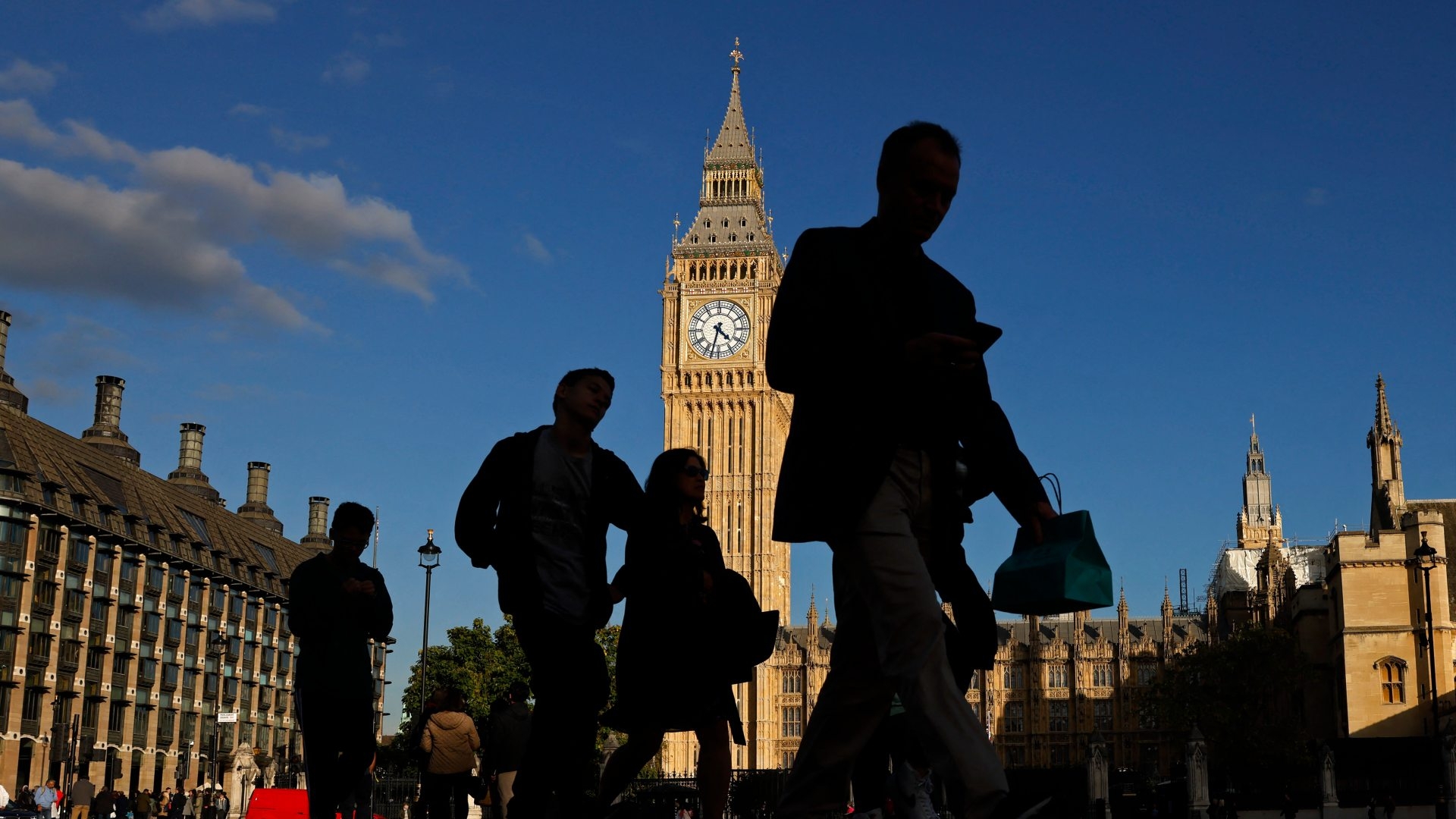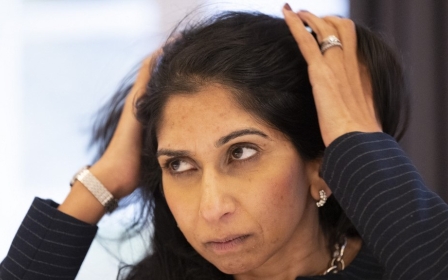Prevent review: Four years of delays, legal challenges, boycotts and leaks

Commissioned by the UK government in January 2019, the independent review of Prevent, its counter-extremism programme, was finally published on Wednesday, two-and-a-half years later than its original deadline for completion - and with questions about its independence, integrity and legality still hanging over it.
Middle East Eye, which has covered the story since the start, looks back over the troubled history of a review that became as contentious as the counter-extremism programme it was set up to scrutinise.
Calls for an independent review
Mounting criticism of the UK government’s Prevent strategy by human rights monitors and Muslim advocacy organisations, as well as questions about its effectiveness, led to growing calls for independent scrutiny of the contentious counter-extremism programme.
In 2015, the parliamentary Home Affairs Select Committee launched an inquiry into the government’s counter-extremism strategy to examine the effectiveness of Prevent and problems associated with it.
New MEE newsletter: Jerusalem Dispatch
Sign up to get the latest insights and analysis on Israel-Palestine, alongside Turkey Unpacked and other MEE newsletters
In evidence to the inquiry, David Anderson, who was then the UK’s independent reviewer of terrorism legislation, called for an independent review of Prevent, arguing that lack of confidence in the programme was “undeniable”.
“When you are dealing with an area where everything is first of all happening in secret and secondly there is a real potential for inhibiting people's human rights there is a very good argument for independent review, and I would apply that to the Prevent strategy as a whole,” Anderson told the committee.
What is the Prevent Strategy?
+ Show - HidePrevent is a programme within the British government's counter-terrorism strategy that aims to “safeguard and support those vulnerable to radicalisation, to stop them from becoming terrorists or supporting terrorism”.
It was publicly launched in the aftermath of the 2005 London bombings and was initially targeted squarely at Muslim communities, prompting continuing complaints of discrimination and concerns that the programme was being used to collect intelligence.
In 2011, Prevent's remit was expanded to cover all forms of extremism, defined by the government as “vocal or active opposition to fundamental British values, including democracy, the rule of law, individual liberty and mutual respect and tolerance of different faiths and beliefs.”
In 2015, the government introduced the Prevent Duty which requires public sector workers including doctors, teachers and even nursery staff to have “due regard to the need to prevent people being drawn into terrorism”.
A key element of Prevent is Channel, a programme that offers mentoring and support to people assessed to be at risk of becoming terrorists. Prevent referrals of some young children have proved contentious. 114 children under the age of 15 received Channel support in 2017/18.
Criticism of the Prevent Duty includes that it has had a “chilling effect” on free speech in classrooms and universities, and that it has turned public sector workers into informers who are expected to monitor pupils and patients for “signs of radicalisation”. Some critics have said that it may even be counter-productive.
Advocates argue that it is a form of safeguarding that has been effective in identifying and helping troubled individuals. They point to a growing number of far-right referrals as evidence that it is not discriminatory against Muslims.
In January 2019 the government bowed to pressure and announced that it would commission an independent review of Prevent. This was supposed to be completed by August 2020. After being forced to drop its first appointed reviewer, Lord Carlile, over his past advocacy for Prevent, it conceded that the review would be delayed.
In January 2021 it named William Shawcross as reviewer. Shawcross's appointment was also contentious and prompted many organisations to boycott the review. Further delays followed. Shawcross's review, calling for a renewed focus within Prevent on "the Islamist threat", was finally published in February 2023 - and immediately denounced by critics.
In its final report, published in August 2016, the committee said that concerns about Prevent within Muslim communities needed to be addressed, warning that it would otherwise continue to be viewed by some as “toxic”.
It called for independent review of the decision to place the Prevent duty, which required teachers, doctors and other public sector workers to have “due regard to the need to prevent people from being drawn into terrorism”, on a statutory basis.
In March 2018, Neil Basu, then a deputy assistant commissioner in the Metropolitan Police and one of the UK’s most senior counter-terrorism police officers, backed calls for a review, saying it would be a “healthy thing”.
Later that year, demand for a review grew louder as the government sought to extend the scope of Prevent and introduce contentious new powers through the Counter-Terrorism and Border Security Bill.
In a submission to parliament, Fionnuala Ni Aolain, the United Nations’ special rapporteur on the promotion and protection of human rights and fundamental freedoms while countering terrorism, called for the government to launch an independent review incorporating “a comprehensive assessment of the Strategy’s human rights impact”.
This call was echoed by human rights and civil liberties organisations including Amnesty, Human Rights Watch and Liberty.
As part of the bill’s passage through parliament, the House of Lords voted in favour of an amendment committing the government to commissioning an independent review of Prevent.
On 22 January 2019, Security Minister Ben Wallace said the government would accept the amendment and initiate a review, while taking aim at critics of the programme.
Wallace said: “I have decided that the time is now right to initiate a review of Prevent. Communities across the country have got behind the policy and are contributing to it because they want, as we do, their own young people to be protected from grooming and exploitation by terrorists.”
He added: “This review should expect those critics of Prevent, who often use distortions and spin, to produce solid evidence of their allegations.”
The Counter-Terrorism and Border Security Act became law on 12 February 2019, requiring the government to appoint a reviewer within six months (by 12 August 2019), and present the report and the government’s response to parliament within 18 months (by 12 August 2020).
Lord Carlile steps up - and stands down
On 12 August 2019, the statutory deadline for naming an independent reviewer, the government announced the appointment of Lord Carlile, like Anderson a former reviewer of terrorism legislation, to the role.
Security Minister Brandon Lewis said: “We are continually improving and evolving the programme, and I look forward to seeing Lord Carlile’s recommendations on how we can learn more about what works and where we need to improve.”
Carlile’s appointment was immediately contentious. Carlile had provided independent oversight to a previous review of Prevent by the Home Office in 2011 in which he had given his “considered and strong support”.
He was also a member of a secretive Home Office committee responsible for enforcing the implementation of the Prevent duty by public bodies, as Carlile himself had revealed during a House of Lords debate on calls for a Prevent review.
'There seems to be little purpose in an "independent review" whose outcome is pre-ordained by Lord Carlile’s self-declared partiality'
– Rights and advocacy groups' statement
In the same debate, Carlile said of Prevent: “I admit I played a part in it, so I may be somewhat biased towards it.”
He expressed concerns about “a proliferation of independent reviewers” and questioned whether there was any public interest in a review of the programme.
Carlile was also on record speaking in support of the Prevent programme.
In evidence to parliament’s human rights committee in 2016, he said he could tell “anecdotes of successful Channel interventions that would warm your hearts”, referring to the counter-radicalisation programme within Prevent targeted at young people deemed vulnerable to extremism.
And in May 2019 he described the Prevent review as “completely unnecessary, based on fictitious or complete lack of evidence”.
Days later, a group of human rights organisations and Muslim advocacy organisations condemned Carlile’s appointment and criticised the lack of an open recruitment process for the position.
“There seems to be little purpose in an ‘independent review’ whose outcome is pre-ordained by Lord Carlile’s self-declared partiality. His appointment to this vitally important position shatters the credibility of the review from the outset,” they said.
On 29 August, Rights Watch (UK) – now known as Rights and Security International – launched legal action against the government, challenging the legality of Carlile’s appointment.
It also called for a review of the review’s terms of reference, arguing that by asking how Prevent could be improved in response to criticism the government appeared to presuppose that the reviewer would conclude that the strategy ought to continue.
In December 2019, the High Court granted Rights Watch (UK) permission to bring a judicial review against the government. Days later, the government wrote to Rights Watch (UK) to say it had dropped Carlile as reviewer.
“This is an outstanding victory for those who are committed to seeing a genuine and robust review of the Prevent strategy,” said Yasmine Ahmed, then the executive director of Rights Watch (UK).
Shawcross: 'trolling' Muslims
Faced with the threat of further legal action by Rights Watch (UK), the government said it intended to recruit Lord Carlile’s successor through a “full and open recruitment process”. In April 2020 it launched “an open competition to appoint the next Independent Reviewer of Prevent”.
With the statutory deadline for publication of the review due to expire in August 2020, the government introduced legislation to nullify that deadline, setting a new target for completion of the review by August 2021.
In November 2020, the Telegraph reported that William Shawcross had “emerged as a frontrunner” to review Prevent, with the newspaper reporting that Shawcross was seen as “well qualified for the job”.
Shawcross, best known as a journalist and author, was a former chair of the Charity Commission, and a former director of a controversial neoconservative think tank, the Henry Jackson Society.
Shawcross’s appointment was confirmed by the government in January 2021.
Home Office minister Baroness Williams described Prevent as playing an “essential role in stopping vulnerable people being drawn into terrorism.
“It is important that this vital programme continues to improve and I look forward to seeing Mr Shawcross’s recommendations in due course,” said Williams.
But the appointment proved to be just as contentious as Carlile’s, with critics seizing on remarks Shawcross had made in a speech in the US in 2012, while still director of the Henry Jackson Society, in which he had said “Europe and Islam is one of the greatest, most terrifying problems of our future.”
In a statement, the Muslim Council of Britain accused the government of wanting to “troll Muslims and sweep widespread concerns about Prevent under the carpet”.
Sarah St Vincent, the executive director of Rights and Security International, told MEE: “The government had a vast field of potential candidates to choose from. Choosing someone who hasn't been accused of Islamophobic comments is a pretty low bar."
Those speaking out also included Nazir Afzal, a former chief prosecutor for the northwest of England, who said he had been encouraged by a senior government official to apply for the role - only to read that Shawcross was considered the frontrunner before he had been interviewed.
“The fact that it was leaked that Shawcross was the government’s favourite even before I was interviewed by ministers suggests that the government had already made up its mind about its preferred candidate from the outset, and was simply going through the motions to avoid scrutiny about the appointment,” Afzal told Byline Times.
In February 2021 a group of human rights and civil liberties organisations, including Amnesty and Liberty, said they would boycott the Shawcross review and accused the government of using the process to try to “whitewash” Prevent.
“Shawcross’s appointment, given his well-known record and previous statements on Islam… brings into question the good faith of the government in establishing the review and fundamentally undermines its credibility,” the organisations said in a statement.
In March, many Muslim organisations and prominent community leaders put their name to an open letter pledging to boycott the Prevent review, citing Shawcross’s “track record of hostility to Islam and Muslims”.
In a letter to the Guardian responding to criticism of his appointment, Shawcross said that some of his views had been “misrepresented or misinterpreted”.
Once again, the deadline for the review was pushed back, with Shawcross due to deliver his report to the government by the end of September 2021, and the report and the government’s response to be published by 31 December 2021.
But on 24 December 2021, the government said it had given Shawcross an extension into 2022 to complete the review – without fixing a new date for its delivery or publication.
Legal issues and leaks
Meanwhile, concerns about the detrimental and discriminatory impact of Prevent, especially within Muslim communities, continued to grow.
In February 2022, The People’s Review of Prevent, an alternative review endorsed by many of the organisations which had boycotted the official process, concluded that Prevent was “ineffective, disproportionate and discriminatory” against Muslims.
It highlighted the impact in particular on children and young people, who it said had been brought within “an extraordinary net of surveillance” by the Prevent duty in schools and colleges.
In May, the Guardian reported that it had seen extracts of the Shawcross review, which the newspaper said had been delivered to the Home Office at the end of April.
It said the review would call for a renewed focus on Islamist extremism while criticising the extension of the programme to tackle far-right extremism.
Further leaks followed. In September 2022, The Telegraph reported that Home Secretary Suella Braverman was planning an urgent overhaul of Prevent based on what it described as Shawcross's "damning findings" and "excoriating assessment" of the programme.
The newspaper reported that Shawcross would say that Islamist extremists were now "severely under-represented" in Prevent referrals, and criticise the programme's increased focus on far-right extremism.
In December 2022, with the review still unpublished, The Times reported that its publication had been delayed by Home Office lawyers because of legal concerns over the naming in it of several individuals and organisations accused of spreading Islamist extremism.
Shawcross was “increasingly frustrated and annoyed” by delays to the review, it said.
'What we see in the so-called independent review is a rehashing of divisive talking points determined at stigmatising Muslims and Muslim civil society'
- Muslim Council of Britain
A source close to Shawcross told the paper: “There is widespread unhappiness to the approach of the Home Office, saying ‘we can’t say this or that about organisations’, redacting and removing certain bits about certain organisations and individuals. He’s frustrated and not buying the excuses.”
Meanwhile, the government has continued to face threats of legal action over the review.
Last month, Rights and Security International questioned the lawfulness of the process in a letter to the Home Office, citing emails and details of meetings it had obtained through a Freedom of Information request which it said raised concerns that the department had “interfered significantly” in the review.
St Vincent, of Rights and Security International, said: “This is a fundamental issue of good governance, and the idea that the UK government might be willing to put the label of ‘independence’ on a report in which it has interfered behind closed doors is Orwellian and deeply alarming.”
Prior to its release on Wednesday, the Muslim Council of Britain also questioned the independence of the review, and warned that its conclusions would leave British Muslims feeling less protected.
Zara Mohammed, the secretary general of the MCB, said: "What we see in the so-called independent review is a rehashing of divisive talking points determined at stigmatising Muslims and Muslim civil society."
Middle East Eye delivers independent and unrivalled coverage and analysis of the Middle East, North Africa and beyond. To learn more about republishing this content and the associated fees, please fill out this form. More about MEE can be found here.








